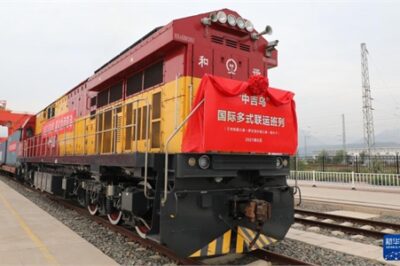In a historic ceremony in Beijing, China, Kyrgyzstan, and Uzbekistan, they signed a trilateral intergovernmental agreement to construct a new railway line, which was set to revolutionize trade and economic cooperation between the three nations. Chinese President Xi Jinping, Kyrgyzstan President Sadyr Japarov, and Uzbekistan President Shavkat Mirziyoyev hailed the agreement as a symbol of unity and shared progress, praising its potential to foster closer ties and cooperation between their nations.
The signing of this agreement marks a significant milestone in the cooperation between China, Kyrgyzstan, and Uzbekistan, demonstrating their commitment to enhancing regional cooperation and economic growth. The project will unite China, Kyrgyzstan, and Uzbekistan in a new era of cooperation, driving economic development and prosperity in the region through joint efforts and collaboration.
Railway Project Details
The new railway will stretch 523 kilometers, connecting China’s Kashgar with Andijan in eastern Uzbekistan, passing through Torugart, Kosh-Dobo, and Kazarman in Kyrgyzstan. The project, estimated to cost $8 billion, will be constructed through a joint venture involving the three countries. The Kyrgyzstan section will span 266 kilometers, with a total cost of $4.7 billion.
The railway project is expected to be completed in the next few years. Its construction is being undertaken by a joint venture company comprising Chinese, Kyrgyzstan, and Uzbekistan companies. The project will create thousands of jobs and stimulate economic growth in the region.
Economic Benefits and Connectivity
The railway is expected to shorten the route between China and Europe by approximately 900 kilometers and reduce freight transit time by eight days. This will create the shortest land route between the two economic centers of the Eurasian continent, establishing direct rail connections between China, Central Asia, the South Caucasus, Iran, Turkiye, and Europe.
The railway will also increase trade volumes between China and Europe, reducing transportation costs and increasing the competitiveness of goods. The project will also enhance regional connectivity, promoting economic cooperation and development in the region.
Transforming Central Asia
The new railway will transform Central Asia from a landlocked to a land-connected region, making it a major transport hub for the Eurasian continent. The project will also intersect with planned and under-construction railway lines in the north-south direction, connecting Russia and Central Asia with the Indian Ocean ports through Afghanistan, Pakistan, Azerbaijan, and Iran.
This will create a comprehensive transportation network, connecting the East and West and promoting economic development in the region. The railway will also increase the region’s access to international markets, promoting economic growth and prosperity.
Reviving the Silk Road
The railway will open up new markets in South Asia and the Middle East, reviving the ancient Silk Road trade route. Uzbekistan’s President Mirziyoyev highlighted the project’s potential, stating that it will become the shortest land channel between China and Central Asia, connecting the region to major markets in South Asia and the Middle East.
The railway will also promote cultural exchange and tourism between the three nations, reviving the historical Silk Road spirit of cooperation and exchange. The project will also increase people-to-people contacts, promoting mutual understanding and friendship between the three nations.
A New Era of Cooperation
The signing of this agreement marks a significant milestone in the cooperation between China, Kyrgyzstan, and Uzbekistan. The project demonstrates the commitment of the three countries to enhancing regional cooperation and economic growth, promising a brighter future for the region.
The new railway line will not only promote economic development but also strengthen regional cooperation, promoting peace and stability in the region. The project is a testament to the power of cooperation and collaboration, demonstrating that nations can work together to achieve common goals and promote mutual prosperity.

International Relations student with solid academic basis in Diplomatic Relations, International Law and Intercultural Communication. Her writings focus on international relations, feminism and current trends.








